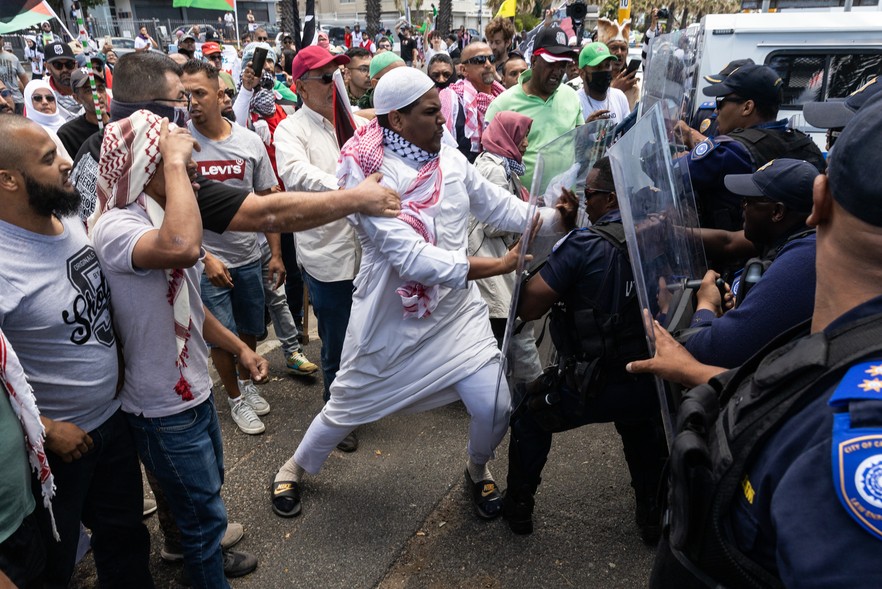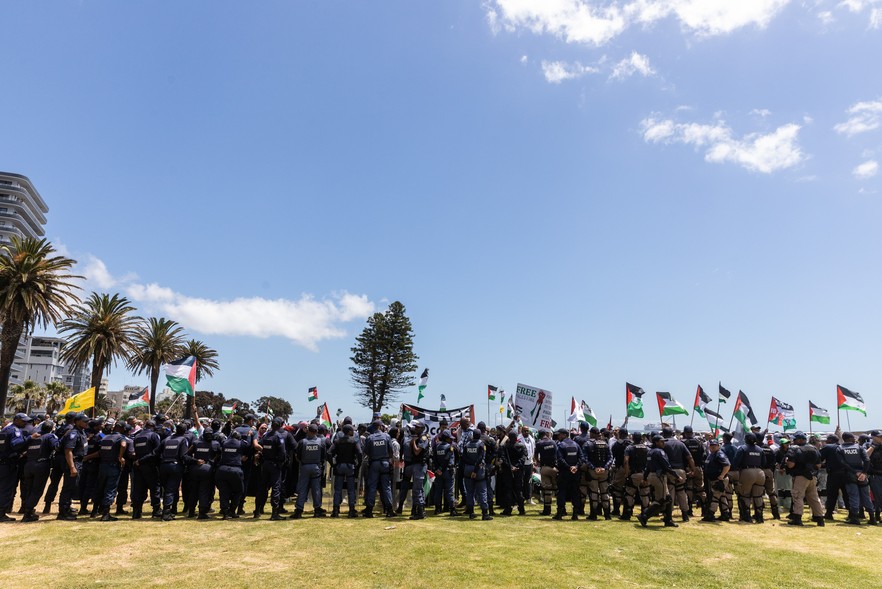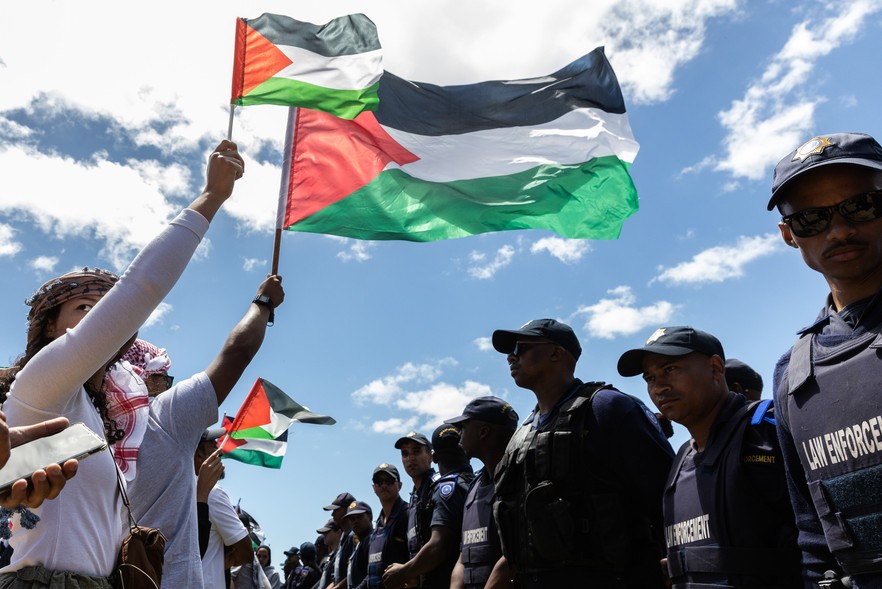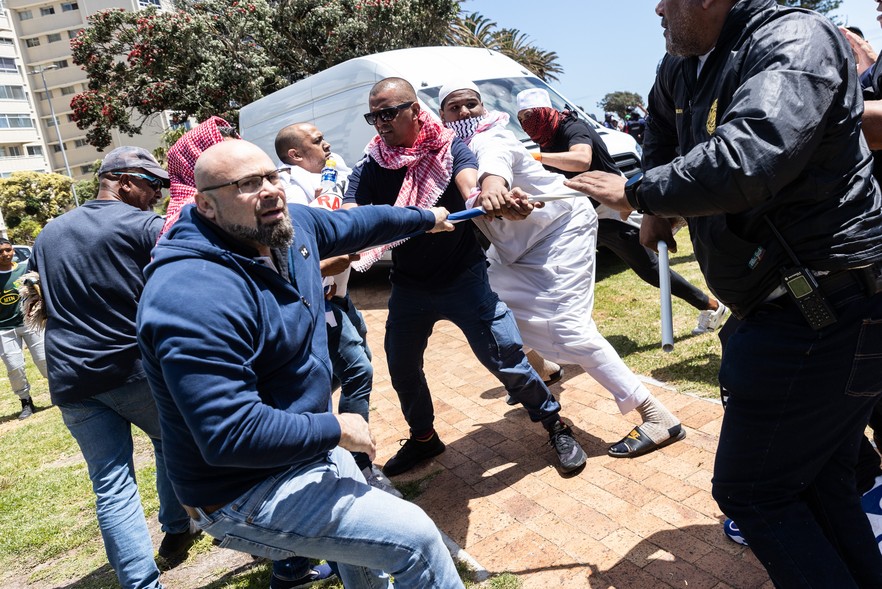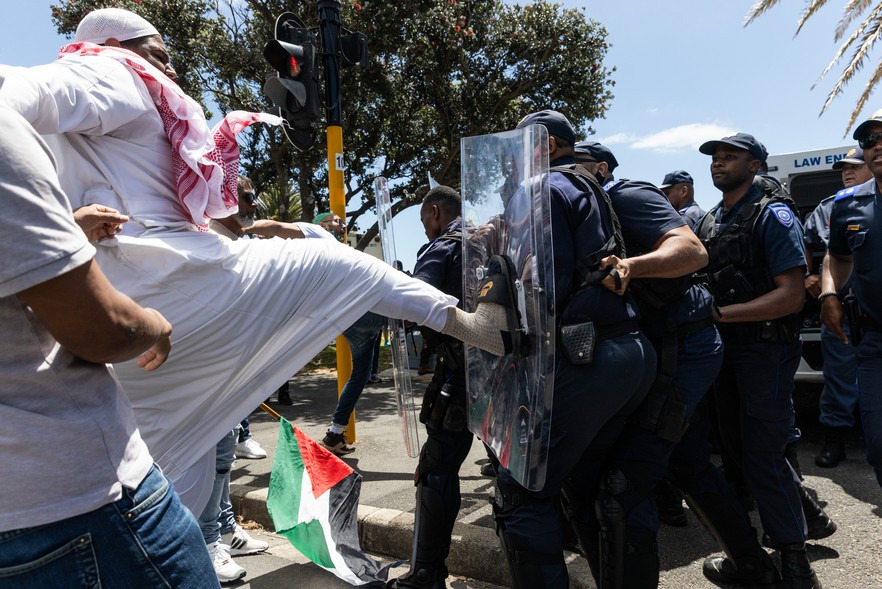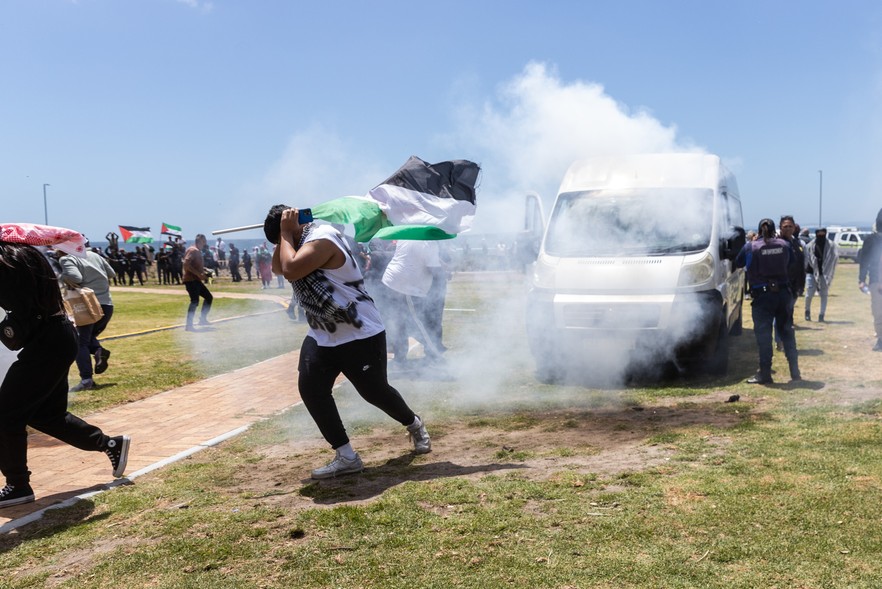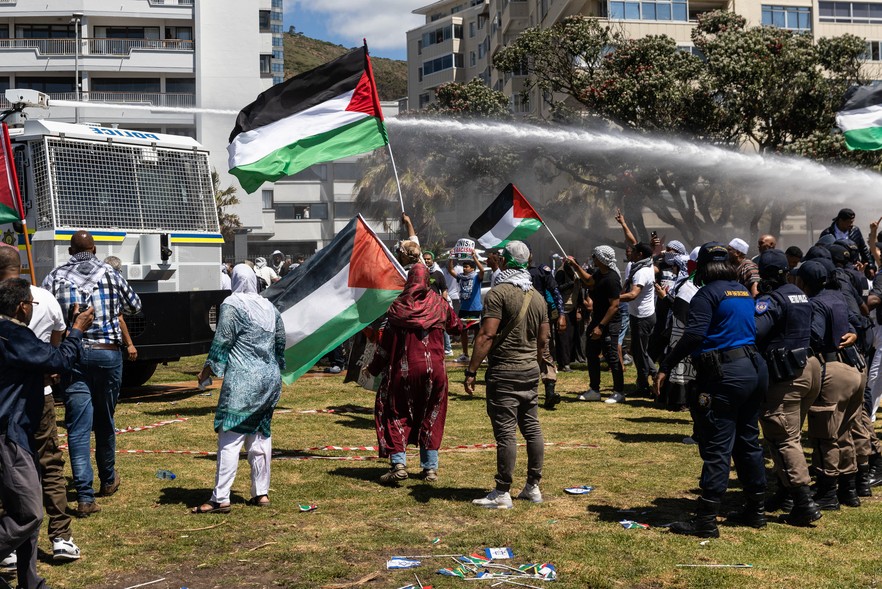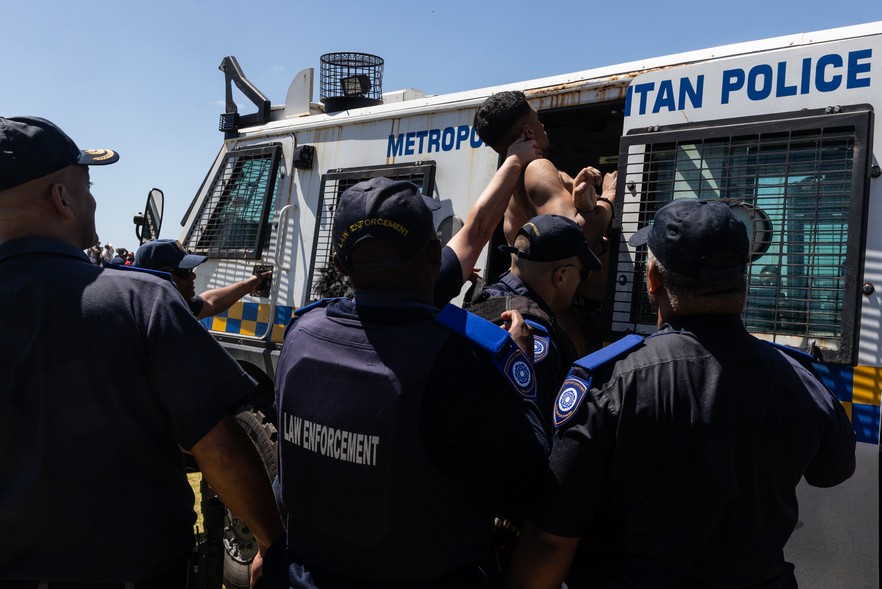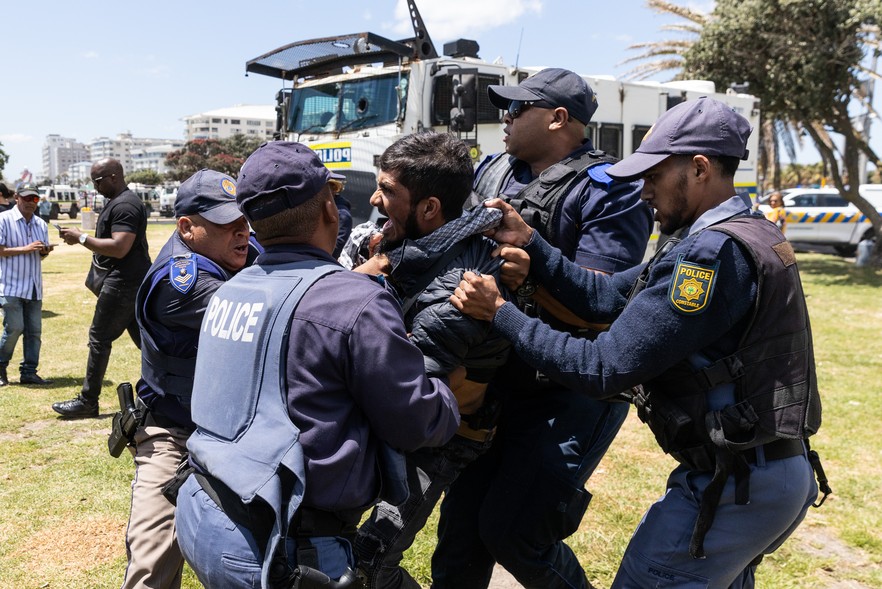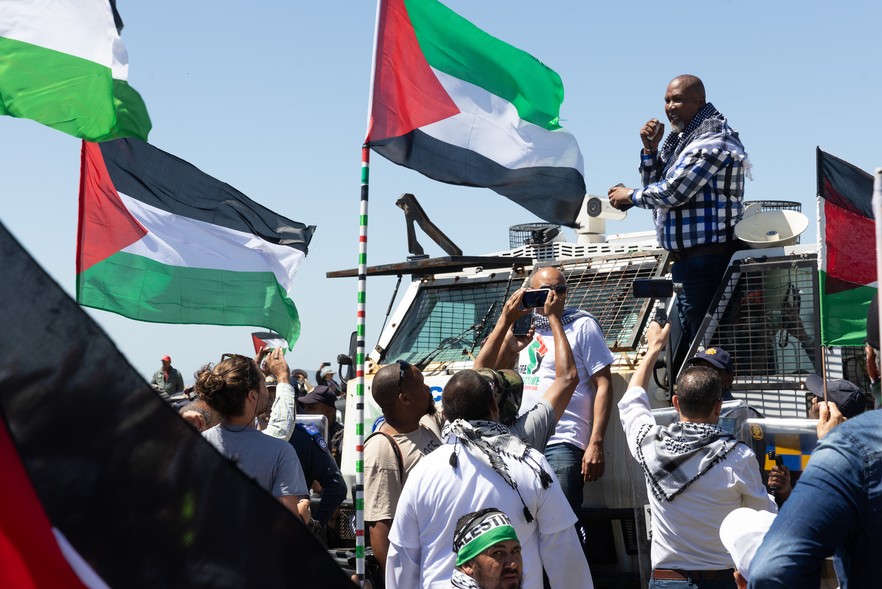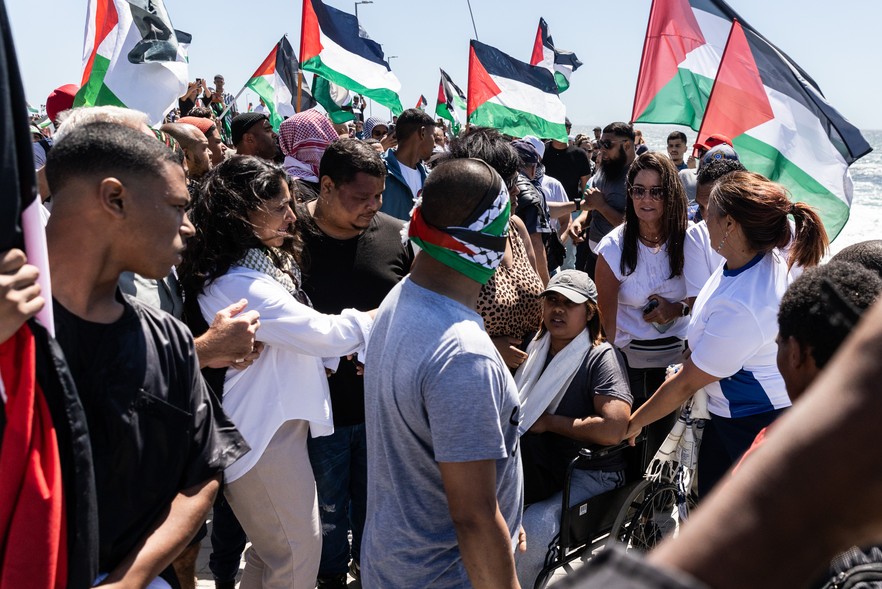Pro-Israel protest disrupted in Cape Town
Mayor Geordin Hill-Lewis calls for tolerance, emphasises right to protest and condemns threat against Jewish school
Pro-Palestinian supporters clash with police during a counter protest against Israeli supporters in Sea Point, Cape Town, on Sunday. Photos: Ashraf Hendricks
A pro-Israeli protest at the Sea Point Promenade in Cape Town on Sunday was disrupted by pro-Palestinian protesters. Buses of protesters for Israel were sent away after the police started using stun grenades and water cannons to disperse a group of the counter-protesters for Palestine.
When GroundUp arrived, there was a standoff between protesters and police in riot gear. There was a heavy police presence, with City law enforcement and SAPS officers present before either protest started. Four people were arrested.
Police separate a large group of pro-Palestinian supporters from a small group of pro-Israel supporters.
Pro-Palestinian protesters raise their flags at the police line.
Tensions were high. The breaking point came when a pro-Palestine protester (right) tried to remove an Israeli flag from a pro-Israel protester (left).
Then things escalated as protesters took their frustrations out on police.
Police used stun grenades several times to disperse protesters.
Police also used a water cannon.
Some protesters were arrested.
Mandla Mandela attempted to keep calm by speaking to the pro-Palestinian protesters.
Pro-Israeli supporters, one of whom was in a wheelchair, were harassed by the pro-Palestinian supporters.
Sunday’s clashes followed a massive but peaceful protest in support of the Palestinian people on Saturday. Tens of thousands of people marched through Cape Town city centre calling for the closure of the Israeli embassy and for the Western Cape government to condemn Israel as it did Russia.
On Sunday there were only about a hundred pro-Palestinian protesters. A few dozen pro-Israel supporters, mostly from Christian churches, had arrived but they decided to call off their protest following the clashes.
Reverend Barry Isaacs, a convener of the protest for Israel, said the police were there because of the City, not at their request.
Abeedah Adams, a member of the Palestinian Solidarity Campaign (PSC), said that unlike other marches for Palestine, the counter-protest had no link to any official organisation. “It was more spontaneous: people responding to the posters and the media about the pro-Israeli protest.”
“I think there’s a very strong sentiment that we can’t allow that kind of Zionism. It’s not welcome in the City of Cape Town,” she said.
Both sides inflamed the situation on Sunday. GroundUp saw one of the pro-Palestinian protesters grab an Israeli flag from a pro-Israel protester. Pro-Israeli protesters also attempted to antagonise the pro-Palestinian protesters. Much shouting ensued and there were some clashes. Police used stun grenades to attempt to disperse the group involved in the scuffle.
A section of the pro-Palestinian crowd shouted down leaders’ calls to step back. Protesters also shouted at the police, comparing them to the apartheid-era police force.
Police had to intervene when a small group of pro-Palestine protesters tried to harass a protester for Israel who was in a wheelchair.
Pepper spray was also used at one point.
This was one of many protests in Cape Town over the past month in response to Israel’s bombardment of the Gaza Strip. Armed militias from Hamas entered Israel and killed more than 1,400 people, mostly civilians, and are holding over 200 people hostage in Gaza. In response, Israel has bombed the Gaza Strip, killing more than 11,000 people, including more than four thousand children. It has also intensified its years-long blockade of Gaza, often preventing humanitarian aid from reaching the area.
“Our concern is for the innocent Palestinians that have died just as much as the Jewish people,” Isaacs told GroundUp. “We want to pray for peace and to find a solution.”
He called for politicians to find common ground, but said that Israel had a right to defend itself in response to the 7 October attack.
Threat against Jewish school
Meanwhile, the Jewish Board of Deputies published a statement expressing outrage at what it called antisemitism by one of the speakers at Saturday’s march. This was in response to one of the speakers saying: “We know where the murderers come from, they come from Herzlia, here in Cape Town.” Herzlia is a Jewish school in Cape Town.
“The right to a decent education in a safe environment is a solemn one, vouchsafed by our constitution to every child in our country,” the Jewish Board of Deputies statement said.
Mayor calls for tolerance
Mayor Geordin Hill-Lewis called for tolerance. “Cape Town’s commitment to tolerance and freedom of expression is sacrosanct,” he wrote. “In a time of great global dispute and conflict, Cape Town has thus far been an example of tolerance.”
“While we have seen violent protests all over the world in recent weeks, protests here have been an example of peacefulness, with very few exceptions. As mayor, I have been proud of our city. We have shown restraint, maturity and a commitment to the rights of all residents to express themselves,” he wrote. “I specifically wish to commend the conduct of both those who agree and disagree with [Saturday’s] pro-Palestinian protest for their peaceful conduct.”
“Unfortunately, we saw violent disruptions [on Sunday] against a planned peaceful prayer gathering in support of Israel. This violence deserves the condemnation of all Capetonians who value free expression in our open democracy.”
“While residents or groups may disagree vehemently with one another, they may not engage in violent disruption. We call on all residents to desist from doing so,” Hill-Lewis said. “Every person or group, of every belief and persuasion, has the right to protest peacefully in South Africa.”
“That right is constitutionally protected, and for good reason, because in South Africa’s past certain protests were banned or violently suppressed, and opinions censored,” he wrote. “In the same way that tens of thousands of residents gathered yesterday to protest peacefully, so the planned protest today should have been respected and allowed to proceed peacefully and without interference.”
Hill-Lewis referred to the comments directed on Saturday against Herzlia: “We also condemn any hate speech uttered by radical minorities at protests, especially when that hate speech is directed towards little children. We have received video footage of a representative … speaking at yesterday’s protest and calling young Jewish children in Cape Town ‘murderers’. Such hateful language should similarly be condemned by all. Radical elements do not speak for Capetonians, and do not even speak for the protestors they claim to represent.”
Disclosure: GroundUp’s editor is an alumnus of Herzlia school.
Support independent journalism
Donate using Payfast

© 2023 GroundUp. This article is licensed under a Creative Commons Attribution-NoDerivatives 4.0 International License.
You may republish this article, so long as you credit the authors and GroundUp, and do not change the text. Please include a link back to the original article.
We put an invisible pixel in the article so that we can count traffic to republishers. All analytics tools are solely on our servers. We do not give our logs to any third party. Logs are deleted after two weeks. We do not use any IP address identifying information except to count regional traffic. We are solely interested in counting hits, not tracking users. If you republish, please do not delete the invisible pixel.

